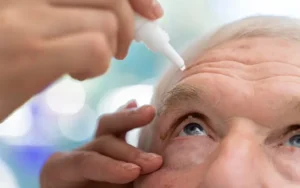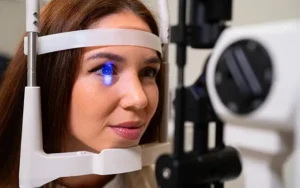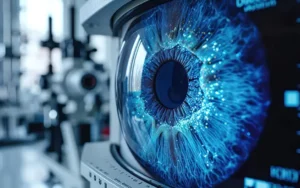Diabetic eye complications can lead to severe visual impairment and even blindness if not managed properly.
Diabetes not only affects blood sugar levels but also has a significant impact on various body organs, including the eyes.
This article explores how diabetes impacts eye health and provides essential tips for managing and preventing these complications.
Understanding Diabetic Eye Complications

Diabetic eye complications primarily arise from prolonged high blood sugar levels that damage blood vessels in the retina.
This can lead to conditions such as diabetic retinopathy, the most common cause of vision loss among people with diabetes.
Other potential issues include diabetic macular edema, glaucoma, and cataracts. Early detection and consistent diabetes management are crucial to preventing these serious complications.
Importance of Regular Eye Screening

Regular eye screening is vital for early detection of changes in the eyes that indicate diabetic complications.
These screenings should include a comprehensive eye exam with dilation to thoroughly examine the retina and optic nerve.
Diabetes patients should have these exams annually or more frequently if recommended by an eye care professional.
Detection of Early Signs: Screening can detect early signs of conditions like diabetic retinopathy and macular edema before they progress to more serious stages.
Prevention of Vision Loss: Timely detection and treatment can prevent irreversible damage and vision loss, maintaining quality of life.
Monitoring Disease progression: Regular screenings help track the progression of eye disease, allowing for adjustments in treatment plans as needed.
Overall Eye Health: Comprehensive exams also check for other eye-related issues that can affect diabetic patients, such as glaucoma and cataracts, ensuring the best eye health management.
Eye Care Tips for Diabetics

Let’s Discuss some eye care tips for diabetics in detail
Managing blood sugar Levels
Maintaining blood sugar levels within recommended ranges is vital for preventing eye complications associated with diabetes. Consistent blood sugar level management reduces the risks of microvascular damage to the eyes, which can lead to diabetic retinopathy.
Blood Pressure and Sugar Control
High blood pressure and elevated cholesterol can exacerbate eye problems in diabetics, increasing the risk of vascular damage within the eyes.
Managing these conditions through diet, exercise, and medications prescribed by healthcare providers is important for protecting eye health.
Protective Care for Diabetic Eyes
Protecting your eyes from UV rays by wearing sunglasses and quitting smoking are essential steps in preventing diabetic eye complications. Both measures help reduce the risk of further aggravating eye conditions and contribute to overall eye health.
Treatment Options for Diabetic Retinopathy
Depending on the severity, treatment for diabetic retinopathy might include laser surgery to reduce blood vessel leakage, and injectable medications to decrease swelling.
Or a vitrectomy to remove blood from the vitreous gel of the eye, early and effective intervention can prevent significant vision loss.
Innovation in Diabetic care
The field of diabetic eye care is rapidly advancing, with a new medication that improves blood flow to the retina and innovative, less invasive surgical techniques that provide better outcomes for patients.
Keeping up-to-date with these options through regular consultations with eye care professionals is important for managing diabetic eye conditions effectively.
How Do We Prevent Severe Diabetic Eye Disease?

We prevent eyes through these given ways, like
Routine checks and Early diagnosis: Regular eye examinations are vital for diagnosing diabetic eye complications in their early stages. Such proactive measures can lead to treatments that are significantly more effective, preventing severe eye diseases that could result in vision loss.
Lifestyle Adjustments for Eye Health: Adopting a lifestyle that includes a balanced diet rich in vitamins and minerals supportive of eye health, regular physical activity, and proper diabetes management plays an important role in preventing severe eye disease that results in vision loss.
CCD Role in Managing Diabetic Eye Health

CCD offers educational programs that provide valuable information about managing diabetes effectively and understanding its impact on eye health. These programs aim to empower patients with the knowledge needed to take charge of their condition.
Support Services and Treatment Access

CCD connects patients with specialized services in diabetic eye care, offering support from diagnosis to treatment. These services include access to ophthalmologists and retinal specialists who are experienced in treating diabetic eye conditions, ensuring patients receive the best possible care.
Conclusion
Diabetic eye complications pose a significant risk, but effective management strategies and support from dedicated healthcare facilities like CCD can help individuals protect their vision and maintain a high quality of life.
Awareness, education, and proactive management are key to preventing complications and ensuring that those with diabetes do not lose sight of what is important.
FAQ’s
What are common diabetic eye complications?
Key issues include diabetic retinopathy, macular edema, glaucoma, and cataracts.
Can diabetic eye complications be reversed?
Some treatments can restore vision or slow disease progression, but many effects are irreversible.
How do you prevent diabetic eye complications?
Control blood sugar, manage blood pressure and cholesterol, eat healthily, exercise regularly, and avoid smoking.












